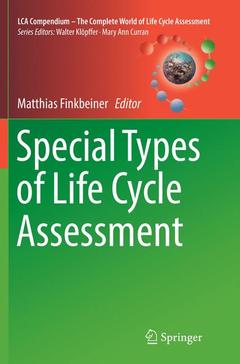Special Types of Life Cycle Assessment, Softcover reprint of the original 1st ed. 2016 LCA Compendium – The Complete World of Life Cycle Assessment Series

This book presents specialised methods and tools built on classical LCA. In the first book-length overview, their importance for the further growth and application of LCA is demonstrated for some of the most prominent species of this emerging trend: Carbon footprinting; Water footprinting; Eco-efficiency assessment; Resource efficiency assessment; Input-output and hybrid LCA; Material flow analysis; Organizational LCA.
Carbon footprinting was a huge driver for the market expansion of simplified LCA. The discussions led to an ample proliferation of different guidelines and standards including ISO/TS 14067 on Carbon Footprint of Product. Atsushi Inaba (Kogakuin University, Tokyo, Japan) and his eight co-authors provide an up-to-date status of Carbon Footprint of Products. The increasing relevance of Water Footprinting and the diverse methods were the drivers to develop the ISO 14046 as international water footprint standard. Markus Berger (Technische Universität Berlin, Germany), Stephan Pfister (ETH Zurich, Switzerland) and Masaharu Motoshita (Agency of Industrial Science and Technology, Tsukuba, Japan) present a status of water resources and demands from a global and regional perspective. A core part is the discussion and comparison of the different water footprint methods, databases and tools. Peter Saling from BASF SE in Ludwigshafen, Germany, broadens the perspective towards Eco-efficiency Assessment. He describes the BASF-specific type of eco-efficiency analysis plus adaptions like the so-called SEEBALANCE and AgBalance applications. Laura Schneider, Vanessa Bach and Matthias Finkbeiner (Technische Universität Berlin, Germany) address multi-dimensional LCA perspectives in the form of Resource Efficiency Assessment. Research needs and proposed methodological developments for abiotic resource efficiency assessment, and especially for the less developed area of biotic resources, are discussed.The fundamentals ofInput-output and Hybrid LCA are covered by Shinichiro Nakamura (Waseda University, Tokyo, Japan) and Keisuke Nansai (National Institute for Environmental Studies, Tsukuba, Japan). The concepts of environmentally extended IO, different types of hybrid IO-LCA and the waste model are introduced. David Laner and Helmut Rechberger (Vienna University of Technology, Austria) present the basic terms and procedures of Material Flow Analysismethodology. The combination of MFA and LCA is discussed as a promising approach for environmental decision support. Julia Martínez-Blanco (Technische Universität Berlin, Germany; now at Inèdit, Barcelona, Spain), Atsushi Inaba (Kogakuin University, Tokyo, Japan) and Matthias Finkbeiner (Technische Universität Berlin, Germany) introduce a recent development which could develop a new trend, namely the LCA of Organizations.
Introducing “Special Types of Life Cycle Assessment”.- Carbon Footprint of Products.- Water Footprinting in Life Cycle Assessment – How to Count the Drops and Assess the Impacts?.- Eco-Efficiency Assessment.- LCA Perspectives for Resource Efficiency Assessment .- Input-Output and Hybrid LCA.-Material Flow Analysis .- Life Cycle Assessment of Organizations.
For the first time, this book acknowledges spin-off methods and tools built on LCA, namely the “Special Types of Life Cycle Assessment”, and their importance for the growth of LCA
Part and consequence of the LCA success story is the increasing development of spin-off methods and tools built on LCA, namely the “Special Types of Life Cycle Assessment”
New approaches, or special types, built on the basis of classical LCA, generated a significant additional momentum to the growth of LCA
The development of “Special Types of Life Cycle Assessment” opens up new opportunities for a credible and robust use of LCA for real world decision-making in the sense of life cycle management and life cycle sustainability management
Date de parution : 04-2018
Ouvrage de 399 p.
15.5x23.5 cm
Disponible chez l'éditeur (délai d'approvisionnement : 15 jours).
Prix indicatif 210,99 €
Ajouter au panierDate de parution : 08-2016
Ouvrage de 399 p.
15.5x23.5 cm
Disponible chez l'éditeur (délai d'approvisionnement : 15 jours).
Prix indicatif 210,99 €
Ajouter au panier

